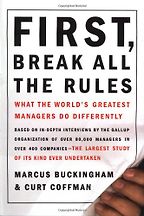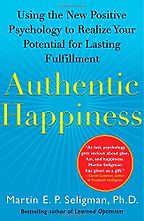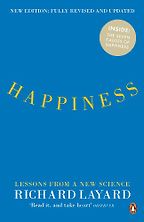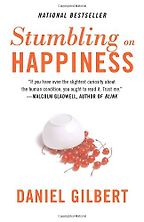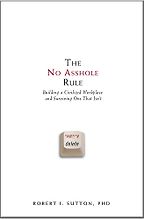Your first book is First, Break All the Rules: What the World’s Greatest Managers Do Differently. What do they do differently?
I’m a sucker for books and I always buy management books when I get on planes. There I am at Heathrow Airport going on a business trip, and I think, ‘I’ve got to read this stuff!’ And normally I pick a book up, read the first few pages, then find I can’t face it and end up leaving it in a hotel room. But this book, I picked it up, started to read it and I thought, ‘Hallelujah! Here is a book that makes sense at last.’ And that was just so refreshing. I don’t even have a copy at the moment, because I have given about ten of them away to people saying, ‘You have just got to read this!’
The main messages of the book are: first of all, as a manager, focus on what a person is really good at. Don’t insist on stuffing into people what they haven’t got; just try and claw out the best of what’s there. And that is a very positive message. Secondly, don’t promote people to their own level of incompetence. Make them feel that they can excel as an individual contributor, that they can be doing good things without becoming a manager. Thirdly, the book is very keen on setting outcomes: tell people what to do, don’t tell them how. And the fourth point is to spend time with your best people. And those four pieces of advice are seared on my brain – I can never forget them.
Spending time with your best people, what does that mean?
You should spend time encouraging your top performers. Because if someone is a star, performing at 95 per cent, if you get five per cent more from them, that’ll get you a hell of a lot more than an additional ten per cent from your 30 per cent performer. So it’s about getting the really good people to do even more. And actually that’s not what most managers do. They spend all their time trying to nurture their weakest players. I hadn’t twigged that myself, but when I read it I thought, how marvellous to spend half an hour with a person who is doing a really great job, and show them some appreciation and recognition and be curious about what they’re doing, rather than spending four hours with someone who is not doing very well.
What do the authors base this all on?
It’s based on Gallup research. They interviewed 80,000 of the best leaders. They didn’t tell leaders to nominate themselves, they told teams to nominate leaders. So this was research done the other way around, because normally you go into an organisation and say to the executive team, ‘Who are your best leaders?’ And they pick the people. And they are not the same people that everybody else would pick. This is common-sense stuff, but of course common sense isn’t very common.
The next book is Authentic Happiness, subtitled ‘Using the New Positive Psychology to Realize Your Potential for Lasting Fulfillment’, by Martin Seligman.
When I heard the title I thought, Oh God! What a title! It’s so American. But I like it because I read Seligman’s work way back when I was a psychology student. He was the man who gave us ‘learned helplessness’ – why men don’t learn how to use washing machines. He did experiments shocking dogs and noticed that two or three out of every ten dogs wouldn’t just lie back and be shocked, they would try to escape. And instead of focusing on the helpless ones, he looked instead at the resilient ones, and set out to find out what made them resilient. What is good about this book is that it puts together lots of his work, as well as lots of other psychologists’ work, in a way that is absolutely readable. It’s also very practical – it tells you why happiness matters, what you can do about it, and how to go about it.
Do you want to quickly explain what positive psychology is?
Psychology has always been about fixing the broken. The standard huge tome that is beaten into all psychology students is called DSM3R, which is diagnostic. How do you tell if someone is a schizophrenic, or if they’ve got depression, or if there is something worse going on? And Seligman said, ‘Hang on, what works? Let’s focus on what works. How do you get more of what works?’ Because just fixing the broken is very, very downbeat. He also argues that we should be grateful for bad experiences, because you only grow by going through tough stuff. You may not like it at the time, but afterwards you benefit from it.
So Seligman is the founding father of positive psychology, though in real life he’s Mr Gloom. He acknowledges that at the beginning of the book, which is very sweet. I’ve seen him lecture and he turns up in a terrible bait, and it’s so funny to have the founding father of positive psychology sitting there in this terrific bait. But it’s a very positive message – think about your strengths and what you’re good at, even if some of them felt a bit a cheesy to a Brit. Could you walk into work and say, ‘My top strengths are my love and my spirituality and my wisdom’? That wouldn’t feel too good to a Brit. But it’s a very uplifting message and approach to life.
How is it relevant to the workplace?
For example, how you argue with yourself when you’re in a low place. He gives you four ways – A E I U. A: what are the alternatives to the situation? The E is what is the evidence you’ve got that you are a hopeless person? The I is what are the implications for you of thinking I am a hopeless person? U is the useful bit: is it useful for me to continue thinking like this? And for me it’s just practical. You can challenge yourself and you can challenge other people. When someone goes: ‘Oh my God, 15 of the team have just been laid off, you and me are going to lose our jobs next.’ You can start disputing: what is the evidence for that? What are the alternatives we’ve got? What are the implications of 15 people being laid off? And that takes you from the past to the future. The usefulness is your own challenge – going around and around in your own brain isn’t very useful. That’s one of the things that makes you depressed, rumination – when you just have these thoughts going round and round in your brain, and you don’t talk about them, and you don’t challenge yourself. Introverted ruminators get depressed. But I don’t like telling people that.
On to Richard Layard’s Happiness: Lessons from a New Science.
So what Seligman did was give us a new approach to life, from a psychologist’s perspective. What Layard did is take happiness issues from an economist’s perspective and say, ‘Come on, if we’re so rich, which we are in the West, how come general happiness has been declining and depression rising? What’s going on? Not at an individual level, but at a country level?’ He synthesises lots of economics and sociology and religion, and psychology, too. And makes it very digestible: it’s presented in short, easy chunks. Sometimes it feels a little random. For example, why is Performance-related pay in between Respect and Advertising?
And what pearls of wisdom emerge from Layard’s book?
He strongly makes the case that standard economic policy doesn’t really take into account feelings, when actually feelings are the only reason you ever decide to do anything. You can look at all the data, but in the end you think does it feel right? That’s the reason you buy a house or take a job.
Get the weekly Five Books newsletter
So he challenges standard economic theory and says we shouldn’t look at wealth, but at wellbeing. It’s quite simple. What is it you say you want for your kids? You want them to be happy. And there are lots of golden nuggets in the book, like the fact that self-help books make you happy. People shouldn’t pooh-pooh them and sneer. Alain de Botton actually says the same thing; the Romans were full of self-help books, so were the Victorians, how come we think self-help is somehow fit to be pooh-poohed?
If I wanted to be very happy at work, what would I take away from the Layard book?
Not much, which is part of the reason I wrote my own book. There were some unanswered questions for me in reading it, and there wasn’t that much about work in there. He says things like only $20,000 makes you happy at work, happy in life. That’s bullshit – that may make you very happy if you’re living in Niger, but if you’re living in New York City, $20,000 is not enough to live on. So there is this kind of mythical number out there, which I’m not sure exists. Layard does make the point that unemployment makes you very unhappy. It makes a big, big dent in your happiness. Work does make you happy. And I think that’s because you get a chance to stretch yourself and achieve your potential.
Let’s talk about Daniel Gilbert’s Stumbling on Happiness. Why is it on your list?
I liked this book because he went inside my brain. This is me operating against my brain, the inner stuff. He really hammers home the fact that you can’t predict what things are going to feel like in the future, and you’re not a good interpreter of the past. Essentially he writes that we’re prisoners of our minds and brains – and we think we’re so different from everyone else, but we’re not. I love this book because it made me laugh. I recognised so much of my own erroneous, crappy thinking. Yes! I do think like that! Damn!
For example?
He says we think that having kids will make us happy, when, actually, when you look at it, people’s overall life happiness is dented by having kids and goes up when kids leave home. There’s one chapter I really liked, it was about the ‘Blind Spot of the Mind’s Eye’. He shows how your brain puts stuff in and takes stuff out for you, starting with your optic nerve. Where your optic nerve is there’s a blind spot, but you never see a hole in your vision. Even though there is one. So your brain is filling in what actually isn’t there. The brain is putting in detail, at the same time as missing it out, which is why you can almost hit a car. The book is a reminder that happiness is complicated and complex and that our brains are flawed. We interpret things with hindsight, and we continually make bad choices. He goes into all the foibles and misinterpretations and the biases and the mistakes we make – and will continue to make.
What about your last book, The No Asshole Rule?
I love this book, because while work is about trying to make a context in which everybody can thrive, and continuously building up trust, you also have to dismantle distrust. You have to do the two things at the same time, in my view. You walk into any school and if they say, ‘We don’t have any bullies,’ my thought is you’re just not looking hard enough. There’s always going to be distrust, there’s always going to be jerks. And there’s always going to be bullies around at work. So how are you going to deal with them? You have to build happiness and dismantle unhappiness at the same time. The book is written by a Stanford professor, but what I like about it is that he really puts it out there, and hits you on the chin, by calling it The No Asshole rule. And he also lays himself open and gives lots of personal examples, which show how he can be one and the rest of us all have the capacity to be one. He refers to keeping your ‘inner asshole in check’. The book is a very quick read – you can read it in a couple of hours – and it really made me laugh.
While making serious points?
Absolutely. For example, I’m not sure that I agree with him that emotional detachment is the best way to survive at work. But I totally agree when he says that passion is an overrated virtue in the workplace. You get some bloke telling you, ‘I’m passionate about female sanitary protection.’ What are you telling me? ‘I’m passionate about data analysis.’ If that’s all you’ve got to be passionate about, please do get a life. So I do agree with this, because it also allows people to go too far. I’m passionate about this, means I can be rude to you, because I’m passionate. He also gives the two sides and argues that sometimes you do need to release your inner jerk, your inner asshole.
How do you that?
You wind up shouting at someone. It’s not a clever way of being, because it winds you up and there’s an emotional cost to that. But I think, sadly, there’s quite a lot of that about, especially post-recession. People feel traumatised. I had it today, actually. I was in a restaurant and ordered some takeaway food. I wanted to sit down, but the server told me, ‘No you can’t, it’s not company policy.’
I said, ‘Hang on, there’s one person in here, other than me – it’s 2.30 in the afternoon. What is the problem? I am offering to pay the difference! And I’ll be out of here in ten minutes.’ It’s just insane. I think when someone says ‘it’s not company policy’ that might be a time to release your inner jerk.
Five Books aims to keep its book recommendations and interviews up to date. If you are the interviewee and would like to update your choice of books (or even just what you say about them) please email us at [email protected]
Five Books interviews are expensive to produce. If you've enjoyed this interview, please support us by donating a small amount.
